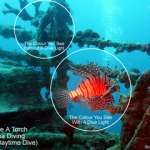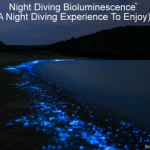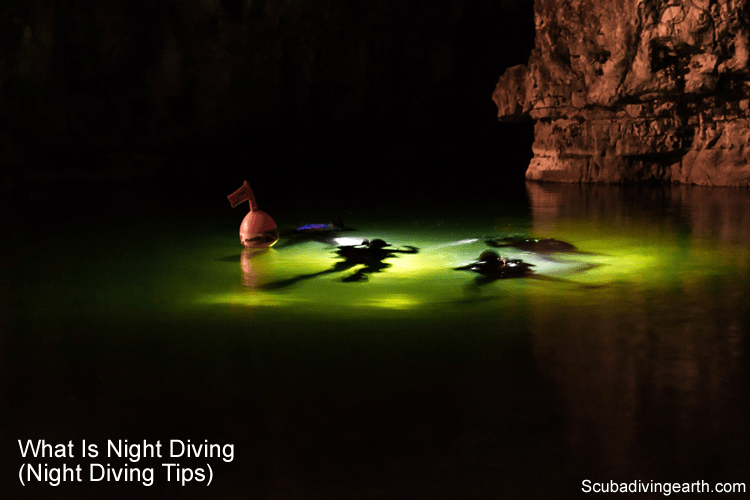
What is night diving and 21 night diving tips for your first night dive
Night diving is fun, but a the beginning it can be a daunting thought to dive in the dark. But once you get over this feeling you’ll realise that night diving is an exciting new dimension to the sport.
Night diving is scuba diving at night or at dusk on which you’ll need a dive torch to illuminate the dive. You’ll experience a smaller field of vision which is only the area illuminated by your divers light. But you will also experience the creatures of the night not often seen during the day.
The best way to do more diving, and especially to do more night diving, is to book yourself on a scuba diving liveaboard. You can check the latest and best deals on liveaboards using the following window:
Your dive will change from an environment that’s lit up by the sun to one that’s illuminated by your divers torch. The creatures you usually see during the day during daylight hours are hiding and asleep.
Why do scuba dives night dive?
Night diving is one of my favourite types of scuba diving. One of my best night dives ever was on the Thistlegorm Wreck in the Red Sea.
The reason this dive on the Thistlegorm was so special is because it’s not that often this can be done. So I’m one of the privileged few that have done this night dive.
Plus I saw the biggest turtles I’ve ever seen sleeping on a platform on the wreck. These two Leatherbacks must have been nearly two metres (6+ feet) in length.
One of the first things you’ll first notice about a night dive is how everything looks and feels totally different. This is even the case even on a scuba dive site that’s familiar to you.
This is partly because you only get to see the small area lit up by your dive light. Everywhere else is in the dark. Except for the other diver’s torch lights if you are diving in a group.
Many of the day time fish are asleep inside the reef, hiding away from predators like sharks that feed at night.
Although I recommend in my scuba diving tips to take things slowly on all dives, with night diving you have to slow down. You have no choice than to focus your attention on the area illuminated by your dive torch.
More Reading: Why use a diving torch scuba diving (It’s not just for night diving)
Night diving tips

1. Always night dive with a dive torch
Whilst using a torch is an obvious tip for night diving it’s still worth mentioning. Make sure you buy a torch which has a good battery life. You want to make sure your dive light will last the time of the dive.
Make sure your torch batteries are fully charged before you dive to avoid having to abort the dive if they run low.
2. Clip your torch to your equipment or use a wrist strap on a night dive
Your dive torch is possibly the most important piece of diving equipment on a night dive. To avoid losing your dive torch clip it on to you. Better still if your torch has a wrist strap make sure you put this around your wrist.
Some torches are negatively buoyant which would mean it will drop to the bottom if you drop it. But of course if your torch is positively buoyant it will float to the surface.
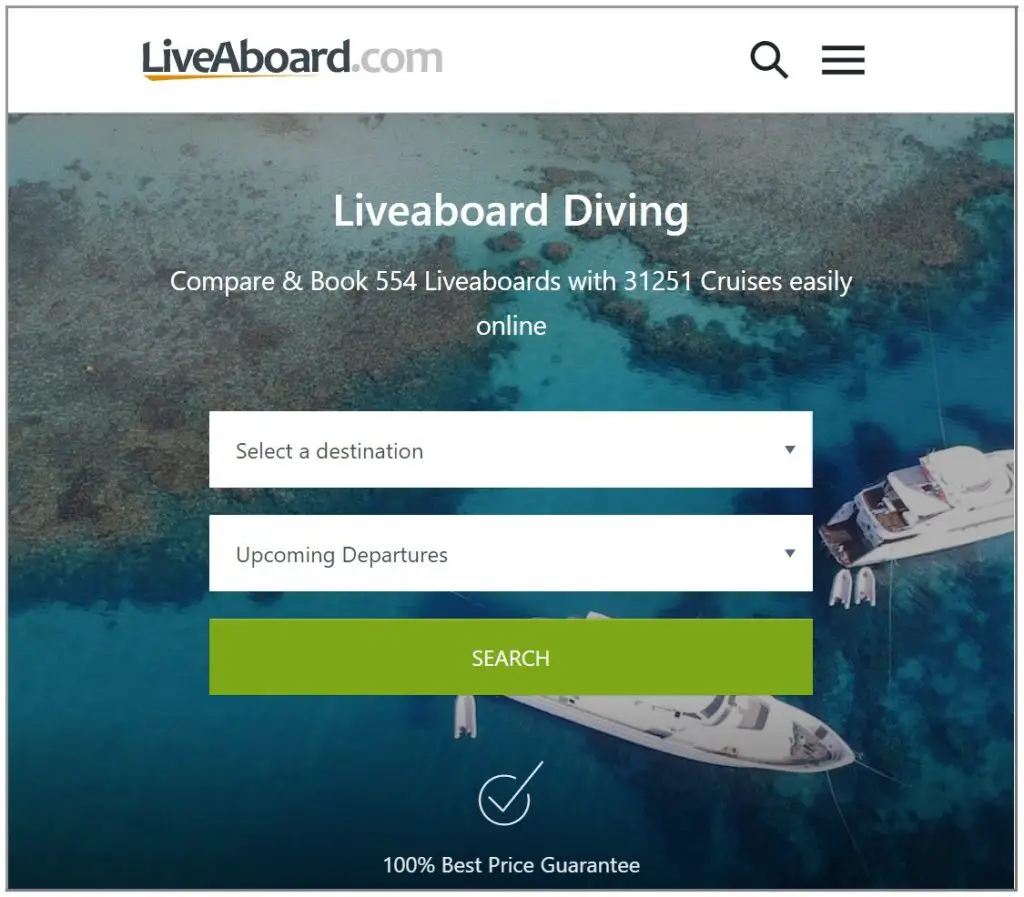
2. Carry a backup torch on your night dives
Good safe diving practice is to carry a small backup torch. This is in case your main torch stops working or runs out of power. Your backup dive light only needs to be a pocket type dive torch.
If you are forced to switch to your backup dive light this might be time to abort the dive. This may be over cautious but with scuba diving it’s always better to be a safe scuba diver than a sorry scuba diver.
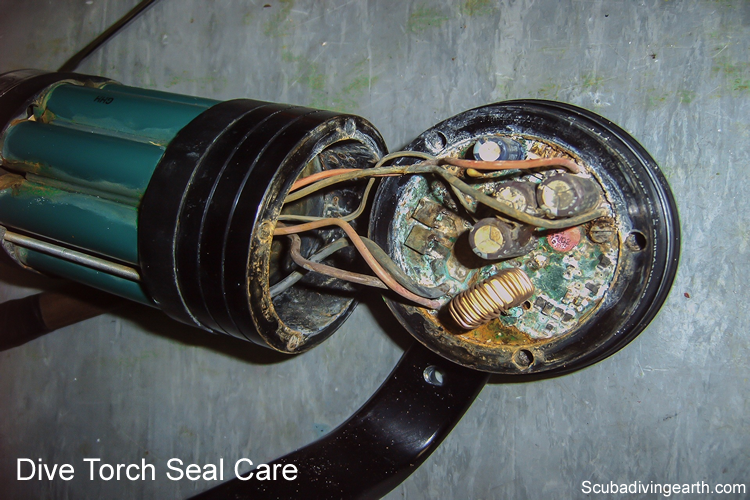
3. Dive torch seal care
If your dive torch requires the batteries to be remove for charging make sure the seal is clean and lubricate with non-corrosive silicone grease.
This happened to me when I finished the night dive with a torch filled with sea water. As you can imagine this destroyed my dive torch!
4. Add a diver safety strobe light to your night diving scuba equipment
A safety strobe light is a good addition to your safety equipment for night diving.
Some divers have their strobe light switch on during the course of the dive. I don’t consider this necessary as you have your dive light. But if your dive lights fail a strobe light helps to be seen.
If have a diver strobe light switch it on as you ascend from your dive.
5. Be careful of the coral reef on a night dive
At night it’s more difficult to see. Therefore be extra vigilant with the coral reef. Be a responsible diver and take care of the underwater world.
6. Stay in sight of your dive buddy
As with normal safe diving practice stay in sight of your dive buddy.
There’s no need to stay on top of each other as you’ll be surprised at how easy it is to see your dive buddy underwater in the dark.
This is more difficult diving at night in low visibility water. The the silt in the water diminishes the lights beam very quickly. Diving in low visibility water is like driving through the fog at night. Your beam is bounced back by the floating plankton and silt in the water, which is similar to how your car lights are bounced back off the fog.
More Reading: How do I get a dive buddy? (5 easy ways to find a dive buddy)
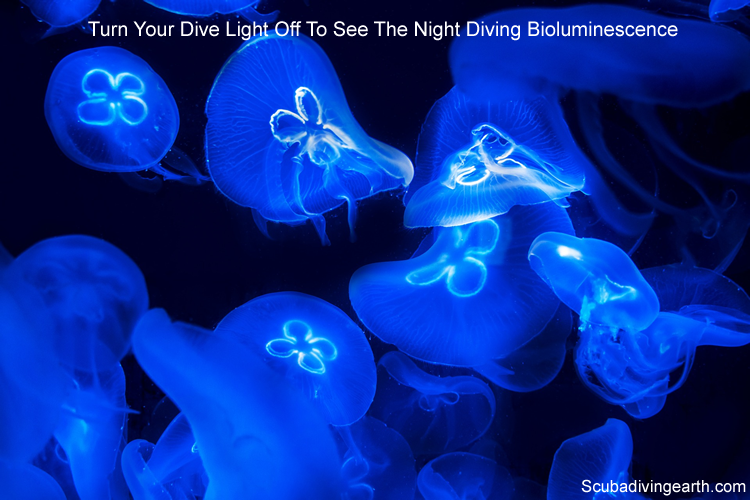
7. Try turning your dive torch or light off to see the night diving bioluminescence
It’s always great to switch your torch off on a night dive. Agree when you do this with your buddy beforehand. It’s even better if you both switch your dive lights off at the same time.
When the dive lights are off wave your hands in the water. You find the water should light up blue with the bioluminescent plankton.
8. Night dive signals
Signalling your buddy on a night dive is better done by shining your dive light on your hand as you give the signal.
9. Night diving light signals
You can use your dive light for signally. But I recommend you run through these signals before you start your dive. You may choose to move the light up and down for yes and side to side for no.
Using light signals to attract the attention of your dive buddy. Point your dive light towards your buddy and wiggle the beam on the reef or bottom near to them. But when doing so never shine the light in their face.
10. Don’t shine your dive light in your buddies face
May be another obvious tip but it’s worth mentioning nevertheless. Don’t shine your dive torch into your buddy’s face.
Your buddy will not thank you for it as they’ll have spots in front of their eyes for a while afterwards.
Also, be careful if you choose to use the ‘miners’ type dive light. These are head torches that attach to your forehead. Be aware that when you look at another diver your light will shine directly into your buddy’s eyes.
Always tilt your dive light down if you need to face your dive buddy to avoid blinding them.
11. Know the dive site
Before any night dive, and especially if you’re not on an organised trip when the instructors know the dive site, make sure you dive the site in day light first.
Firstly you’ll get to see the dive site in the light and observe what sea creatures are out in the day time. Your daylight dive will give you a better understanding of the layout of the dive site too.
12. Shore night dive
If you are doing a shore night dive instead of a boat night dive, make sure you’ve marked the beach in some way.
If there’s already some form of lighting in the backdrop, you should be okay. But if not you should place lights on the beach to guide you back to where you entered the sea.
13. Don’t do a drift night dive
I would’n’t suggest you combine night diving with drift diving. It would be very easy for scuba divers to get lost in the night with a current running.
This problem can happen in the day time. For example, Back in 2007, four divers were lost when they dived on the Elphinstone Reef in a drift, which happened during the day. Four out of the five scuba divers were never found after being swept away on a current.
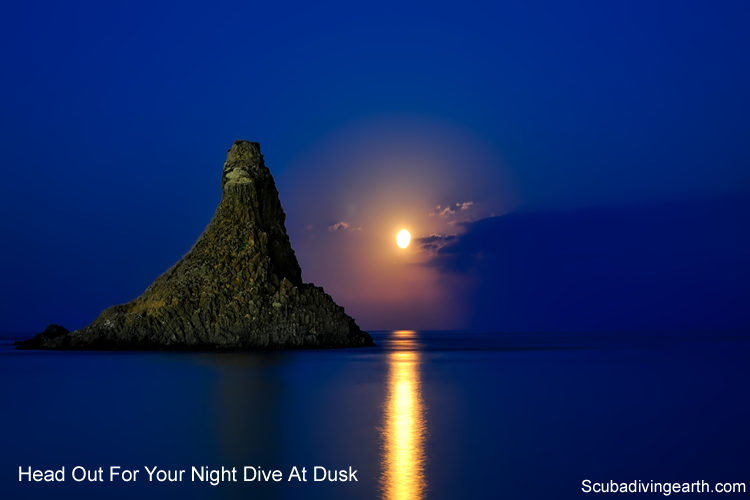
14. Head out for your night dive at dusk
If you head out at twilight or before just before dusk when it’s still light, you’ll be able to kit up in the fading light of the day. Also, if you’re a beginner scuba diver and this is your first night dive, descending when there’s still some daylight may make the dive less daunting.
The other benefit of diving at twilight is you may get to see the change in activity between the day time creatures and the ones that come out at night. You’ll get to witness the changes in the ‘shift,‘ i.e. from the day-shift to the night-shift.
15. Take things slowly on a night dive
On a night dive slow everything down even more than a day time dive. On most night dives you’ll only cover a small area. This slowed-down-scuba-dive will mean you really get to see what’s hidden in the reef or wreck you’re diving on.
16. Don’t shine your dive light directly into creatures eyes
Imagine if someone came into your bedroom at night and shone a light straight in your eyes. I’m sure you wouldn’t be too impressed.
Be respectful of the creatures and their home you are visiting. Always shine your torch light to one side of the animals you see, so they are not blinded by the light.
Also, many dive lights have two light settings. When you’re illuminating wildlife try using the lower power setting. This will lessen the impact of shining a light in their direction.
My favourite night dive was on the Thistlegorm Wreck in the Red Sea when I saw the two large turtles. We were very careful where and how we shone the light towards these beautiful creatures.
17. Getting separated on a night dive
If you get separated on a night dive try switching your light off. It’s likely you’ll be able to spot your buddy in the dark. But if you’re diving is low visibility you may not see their dive light.
More Reading: What should you and your buddy do if separated during a dive?
18. Be prepared to see different things and stay calm and relaxed
Diving at night is a completely different experience. The environment will appear different and you’ll see difference wildlife.
If sharks are present be prepared to see these behaving differently. Sharks hunt at night and will be in predatory mode. Sharks are generally not interested in divers, as they are hunting for their usual meals, so relax and enjoy.
There’s no need to worry about their changed behaviour as this is normal.
19. Look out into the black on a night dive
Don’t simply focus on what’s in front of you. Try shining your torch out into the blackness to see what’s out there.
I remember once seeing a great barracuda on a night dive in the Red Sea looking out into the black that I wasn’t expecting. I will admit to jumping when I saw it.
20. Additional training and certification for a night dive
PADI and SSI have specific courses for night diving. Whereas BSAC don’t have a specific course. But BSCA students will be supervised and guided through their first few night dive experiences.
21. Dive with an experienced diver if it’s your first night dive
If this is your very first night dive always dive with someone that’s a more experienced scuba diver than you. Also, make sure they’ve been night diving before and that they are comfortable underwater in the dark.
22. Carry a sound signalling device
A final useful night diving tip is to carry a sound signally device. This can be used to attract the attention of the dive boat skipper.
Is night diving dangerous?
Night diving isn’t dangerous if you have the right training and experience and you don’t night dive in a current. Whilst there are additional hazards when diving in darkness, which include dive light failure, but if you carry a backup dive torch you will be safe.
Having said that one of the biggest dangers to night scuba divers is other boats. If you’re on an organised liveaboard trip diving at night from a dive boat this problem is unlikely to happen. However, always be aware of this danger.
To improve safety use strobe lights, glow sticks or light sticks and keep your dive torch switched on.
If you dive from the shore be careful if you need to surface out at sea, as you need to be seen by boats and other vessels in the water. Use a strobe light and glow sticks when night diving from a beach.
Are night dives scary?
Night diving may sound a little scary for those who have never tried it before, but it should be treated no differently to a walk outside in the dark. Many get scared at the thought of descending into dark waters with only the beam of a dive light for light, but really there’s no need to be scared.
Night diving equipment
Additional scuba equipment for night diving has already been covered in the tips. But it’s worth running through these once more.
Night diving equipment includes:
- Main dive torch or light.
- Backup dive torch or light.
- Strobe lights.
- Glow sticks or light sticks.
- Sound signalling devices.
- Surface marker buoy lights.
What type of scuba divers go on night dives?
Night dives are suitable for all diver types, subject to experience and certification.
I don’t consider certification necessary for night diving. But before you do your first night dive I recommend you dive with someone experienced for your first couple of night dives for your own safety.
Night dives can be enjoyed by all divers, but only dive within your level of qualification and experience.
One of the best ways to go night diving is from a dive liveaboard, which is why I’ve included a table of all dive liveaboards from around the world.
Table of dive liveaboards
This list of liveaboards is in descending customer rating order, followed by Scuba Diving Luxury Rating (SDE Lux Rating, see below), so the liveaboards with the highest customer rating and the best SDE lux rating will be at the top of the list. If you want to change the list order, use the “Sort by” dropdown below.
| Discover Liveaboard | Customer Rating | SDE Lux Rating % | Flexible Booking | Dive Courses | Dietary Requirements | Nitrox | Country | |
|---|---|---|---|---|---|---|---|---|
 |
Review: BVI Aggressor; Book: BVI Aggressor | 10 | 71% | NO | YES | YES | YES | Virgin Islands |
 |
Review: Seven Seas; Book: Seven Seas | 10 | 71% | NO | NO | YES | YES | Indonesia |
 |
Review: MY Hammerhead I; Book: MY Hammerhead I | 10 | 71% | YES | YES | YES | YES | Egypt |
 |
Review: MV Andromeda; Book: MV Andromeda | 10 | 65% | NO | YES | YES | YES | Egypt |
 |
Review: Cahaya Bersama; Book: Cahaya Bersama | 10 | 63% | YES | YES | YES | NO | Indonesia |
 |
Review: MV Tarata; Book: MV Tarata | 10 | 52% | NO | NO | YES | YES | Indonesia |
 |
Review: MV Ghani; Book: MV Ghani | 10 | 50% | YES | YES | YES | YES | Egypt |
The Scuba Diving Earth Luxury Rating (SDE Lux Rating) is explained on each liveaboard review when you click the “Discover Liveaboard” link, and is my own Liveaboard Luxury Rating I’ve assigned to all liveaboards. Choosing between liveaboards is helped by customer scores, and if you get stuck choosing between two or three liveaboards, where each one has a high customer score out of 10, you can use the SDE Luxury Rating to help narrow down your choice.
Think about it like using Booking.com when searching for the best hotel. Booking.com also use a customer score where each customer rates hotels out of 10. This is similar to the liveaboard customer rating, which is also rated out of 10. But let’s say you only like to stay in hotels rated 8 and above on Booking.com, but you also want the hotel to have WIFI or parking, or to have a swimming pool etc. The features each hotel has is usually secondary to the score out of 10.
I hope you enjoyed this article about what is night diving
I’d love to hear from you. Tell us about your adventures of diving and snorkeling, in the comments below. Please also share your photos. Either from your underwater cameras or videos from your waterproof Gopro’s!
If this article hasn’t answered all of your questions. If you have more questions either about snorkeling or scuba diving (or specifically about what is night diving), please comment below with your questions.
There will also be many more articles about scuba diving (and snorkeling) for you to read and learn about these fabulous sports.
Have fun and be safe!

